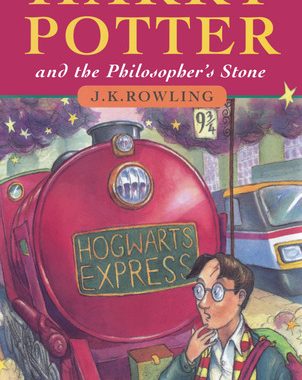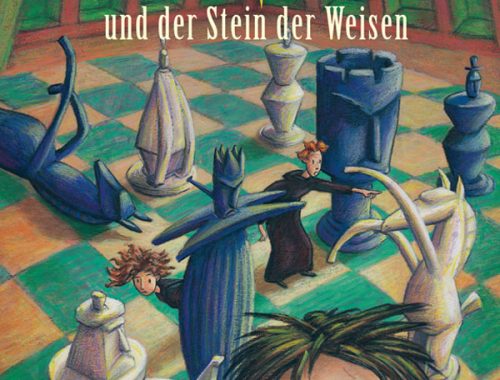After Chapter 1 of Harry Potter and the Philosopher’s Stone essentially serving as a prologue, we fast-forward to the present day for Chapter 2, “The Vanishing Glass”!
General Commentary:
Any goodwill I might have accrued for the Dursleys in Chapter 1 is pretty much blown in Chapter 2. We learn that not only is their son Dursley a repulsive, spoiled little bully, they are also outright abusive to Harry, making him sleep in a spider-infested cupboard, underfeeding him to the point of making him have to steal food to eat (while simultaneously expecting him to cook), making him wear Dudley’s hand-me-downs, and such. Whereas by contrast, they drop heaps of presents on Dudley every year–and even though the kid’s eleven years old, his mother calls him “Dinky Duddydums”. Not to mention, she dresses him in sweaters with bobbles. Seriously?
And these people only grudgingly bring Harry along to the zoo with them–after considering such options as making him sit in the car, which Vernon shoots down only because the car is new.
Which leads into the scene where Harry talks to the snake, a scene that wound up in the second movie rather than the first one. It is an excellent little scene, our first on-camera sign of Harry’s unusual abilities (albeit sprinkled with backstory descriptions of other odd things he’s done). It leads nicely into the ramping up of the strangeness in Chapter 3!
Two Countries Separated by a Common Language
Harry is described as Dudley’s favorite “punch-bag” in the UK edition, and “punching bag” in the US.
Harry’s glasses are held together with Sellotape in the UK version, and Scotch tape in the US.
When Vernon tells Dudley “Atta boy”, there is no apostrophe in the UK edition, but there is one in the US.
Punctuation differences: “Mrs Figg” has no period in the UK edition, but in the US, it’s “Mrs. Figg”. Also, I see at least three occurrences of a comma in the US edition that does not appear in the UK one. AND! I didn’t notice this in the first chapter, either–all the dialogue in the UK edition is marked by single quotes, but in the US edition, it’s double quotes.
Dudley’s presents include a couple of differences: “cine-camera” in the UK and “video camera” in the US; “remote-control aeroplane” vs. “remote control airplane”; and “video recorder” vs. “VCR”.
Harry has a “fringe” in the UK edition, but “bangs” in the US. And in this same paragraph, there’s a verb difference: “he had got up” in the UK, “he had gotten up” in the US.
Dudley’s revolting jumper with bobbles in the UK edition is a sweater with puff balls in the US. And in that same paragraph, “glove puppet” in the UK becomes “hand puppet” in the US.
“Bins” in the UK edition’s description of Harry running away from Dudley and his cronies becomes “trash cans” in the US. Likewise, “dustbin” becomes “trash can” later in the chapter.
Harry’s recurring dream about a flying motorbike in the UK edition becomes a dream about a flying motorcycle in the US edition. This was also a difference that occurred in the first chapter, but I didn’t catch it then.
“Chocolate ice-creams” and “cheap lemon ice lolly” become “chocolate ice creams” and “cheap lemon ice pop”.
The description of Dudley’s knickerbocker glory changes. In the UK edition, Dudley’s tantrum is because “his knickerbocker glory wasn’t big enough”. In the US, it’s because “his knickerbocker glory didn’t have enough ice cream on top”.
“Afterwards” becomes “afterward” leading into the scene with the snake. And in that scene, I notice a use of an m-dash in the UK edition becoming a semicolon in the US.
And with all these changes, I have to wonder if it Rowling went through her manuscripts herself to do them all, or whether they had a copyeditor do it!
As a final note: I like that the US ebook actually does have little illustrations in it, at the top of each chapter. It adds a bit of whimsical flavor to the reading experience.
Five Things About the French Edition
Harry’s glasses are held together by “papier collant”, which translates to “adhesive paper”.
Petunia’s endearments to Dudley are slightly less cloying in French. They’re at least not baby-talk. But she does call him “mon petit agneau”, which is “my little lamb”, and “mon canard adoré”, which is “my beloved duck”. (Although later in the chapter, she also calls him “mon Dudlynouchet”.) Likewise, Vernon’s “Atta boy” becomes “C’est très bien”, which makes him a little more formal.
The list of Dudley’s gifts in French is as follows: “le vélo de course, un caméscope, un avion radio-commandé, seize nouveaux jeux vidéo et un magnétoscope”. Note in particular that “caméscope” is “camcorder” and “magnétoscope” is “video recorder/VCR”.
The roll call of Mrs. Figg’s cats changes in the French edition: “Pompom, Patounet, Mistigri et Mignonnette.” (In English, they’re Tibbles, Snowy, Mr. Paws, and Tufty.)
Harry’s cupboard is “placard” in French, which is not to be mistaken for the English word of the same spelling.
French Worldbuilding Terms
There aren’t any terms specific to the wizarding world in this chapter–we know of course that Harry is a Parselmouth, but as he doesn’t interact with any wizard or witch characters here, we have no opportunity to get that word yet.
Five, Well Okay, Six Things About the German Edition
The chapter title in the German is “Ein Fenster verschwindet”–and Fenster is “window”, which sets it apart from both the English and the French, which use “glass” in the title.
And at twenty-one total letters, the prize for longest German word in the chapter goes to “Geburtstagsgeschenken”, which is “birthday gifts”!
The notion of a “punching bag” is discarded in the German edition, which describes Harry as simply “Dudleys Lieblingsopfer”, or “Dudley’s favorite victim”.
Petunia throws endearments like “Liebling” and “Spätzchen” and “mein Süßer”, which are “darling”, “little sparrow”, and “my sweet”–again, a bit less cloying than the baby-talk in the English dialogue. Though she does also call him “Duddybums”, so there is that. Also of note: she calls herself “Mami” to him.
The cats in German are Tibbles, Snowy, Putty, and Tuffy.
Dudley’s “knickerbocker glory” is “Eisbecher Hawaii” in German.
German Worldbuilding Terms
Again, nothing to report here–but things start getting way more interesting in Chapter 3, so we’ll see what terms we get there!


